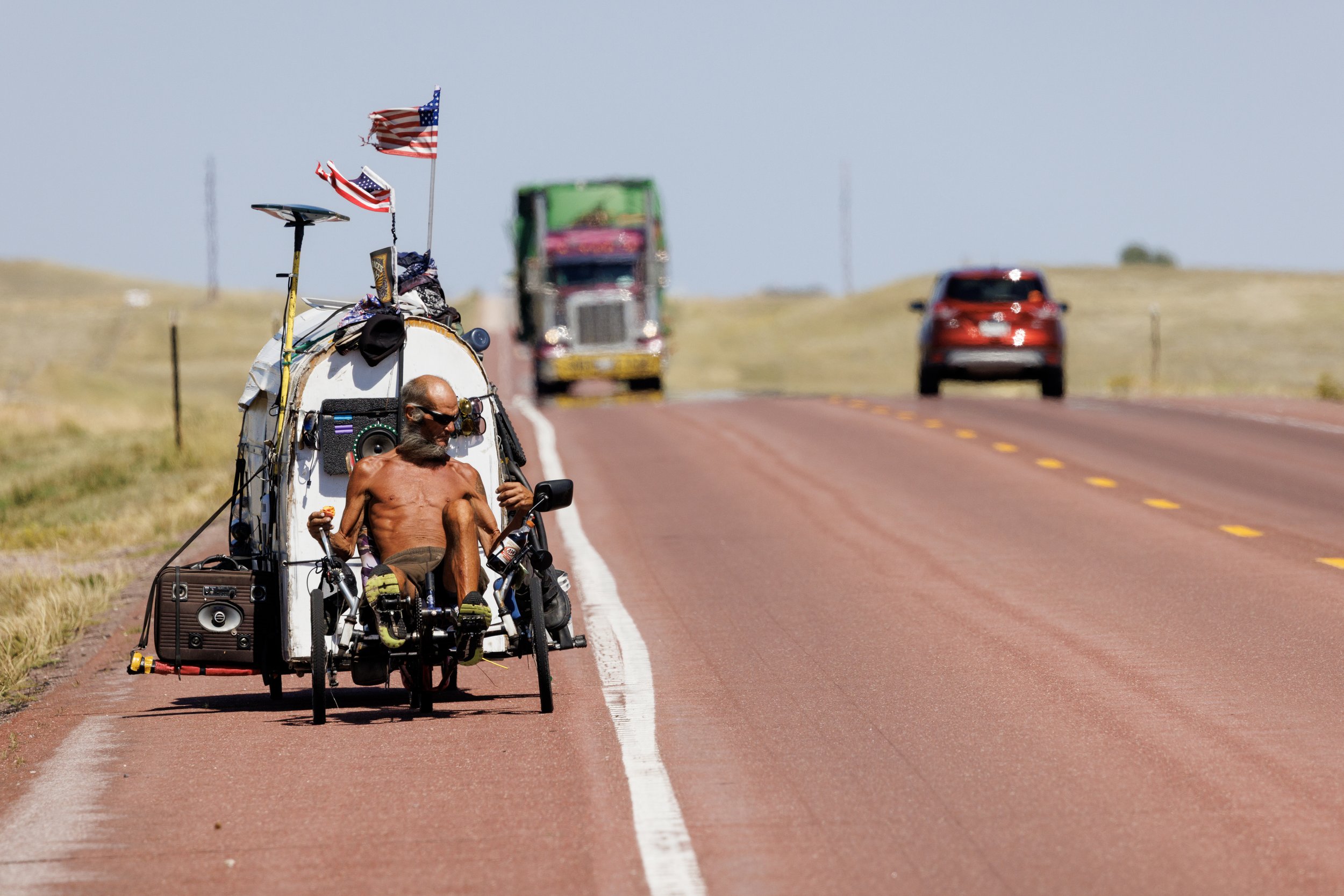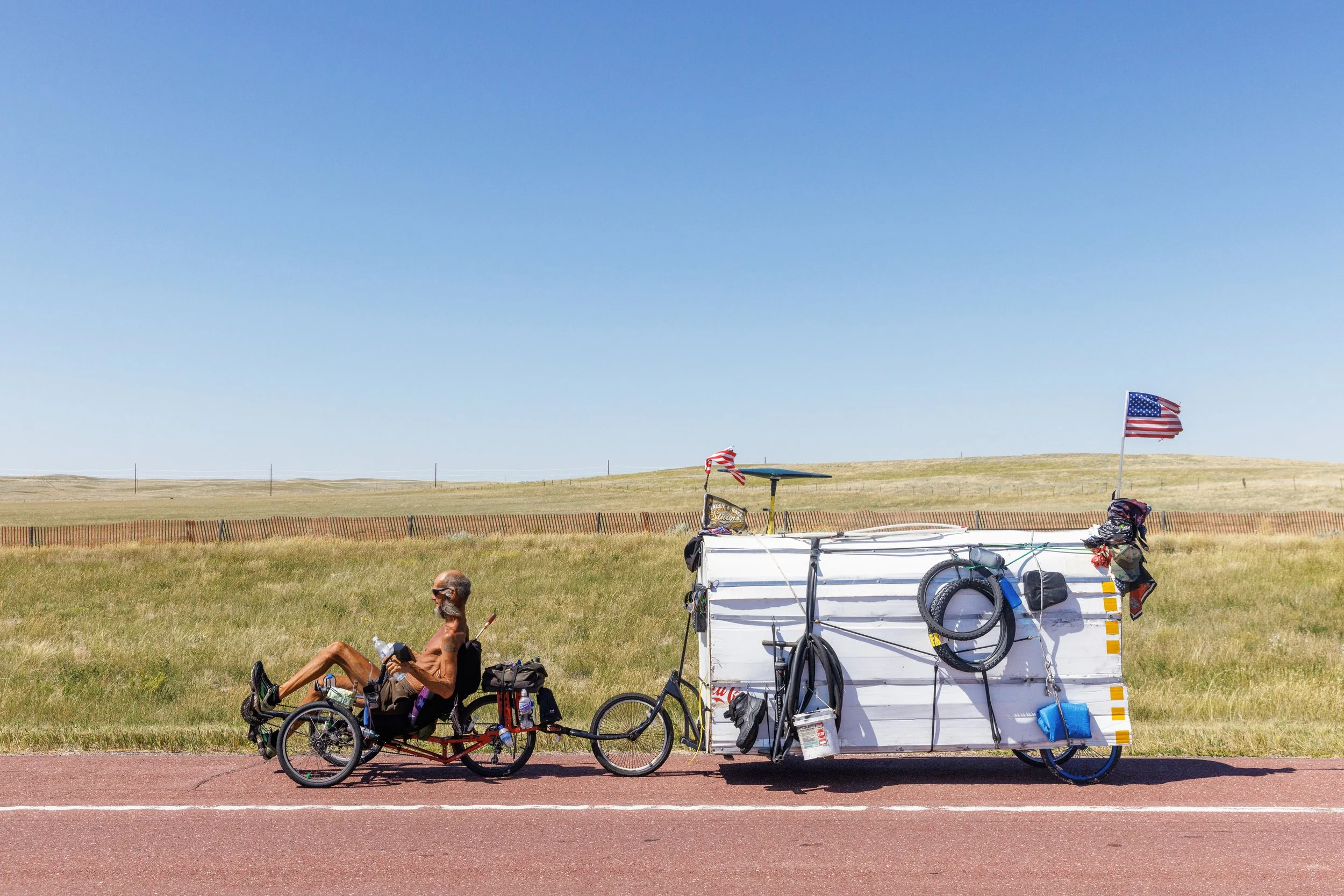Searching for Tony Adams: The man who's been biking America for 25 years
Adams has been riding his bike along American roads for 25 years. I last saw him pulling a 700-pound trailer up U.S. Highway 18 north of Lusk, Wyo., during Labor Day weekend in 2022.
Story and photos by Giles Clasen
Now that Summer is here, I’m on the lookout for Tony Adams.
Adams has been riding his bike along American roads for 25 years. I last saw him pulling a 700-pound trailer up U.S. Highway 18 north of Lusk, Wyo., during Labor Day weekend in 2022.
I’ve been a cyclist since college, but I had never seen anything quite like Adams. He said he hadn’t either, and that he was a true original.
Adams began riding in 1995. “My dad was dying of a stroke,” Adams said. “He asked me to go find my brother and bring him home. My dad wanted to make amends.”
Adams didn’t have a car, so he rode his bike from Oregon to Las Vegas. He wasn’t sure how he’d find his brother, who was living on the streets, but fate stepped in.
“I tapped on a man’s shoulder to ask for directions,” he said, “and my brother turned around.”
Tony Adams tracks everything and hopes the documentation will get him immortalized in the Guinness Book of World Records.
Adams is eager to share his story. He pulled from his trailer a stack of old newspapers from both large and small outlets that had written about his odyssey. He handled each delicate piece of newsprint and other treasured items with care as the Wyoming wind pounded us.
Adams said he’s been featured in more than 50 publications.
Numbers matter to Adams. He keeps track of nearly everything and rattled off these details when we spoke:
He was 57 years old at the time we met. He’s crossed the Continental Divide 21 times. He’s been hit by four cars, two of them hit-and-runs. He had eight flat tires during the summer of 2022. He covers 10 miles of highway in two and a half hours. And he drinks one cup of coffee before bed each night.
He tracks everything and hopes the documentation will get him immortalized in the Guinness Book of World Records. But when I asked why he’s been on the road for so long, Adams turned philosophical.
“I’m searching for answers to questions you haven’t asked,” he said. “And what wisdom am I supposed to learn from people I haven’t yet met?”
Adams takes pride in living outside a traditional life and insists he is not homeless, just free.
“I don’t know if I fit anywhere other than on the road,” he said. “But I’m not homeless. I’m housed, because that’s my house,” he added, pointing to his trailer.
Adams collects his mail at the Murphy Center for Hope in Fort Collins. It’s the closest thing he has to an address, and he stops in a few times a year.
“I try to ride all year, but I’ll find a shelter and hunker down in the winter if the weather gets too bad,” he said.
When he’s riding, Adams said, people are eager to offer help. But in shelters, he feels judged.
“When I’m at a shelter for a few days, I think people see me differently,” he said. “But I try not to be anywhere long enough to be a bother.”
He accepts donations on the road but prefers to work when he needs money. According to Adams, he’s handy and used to do maintenance for a carnival before he began his bike tour.
We spoke briefly on the shoulder as semis roared past inches away. I didn’t want to risk our safety, so I let him keep moving.
I hoped we’d reconnect in Fort Collins for a longer conversation. I wanted to write more about a man who finds purpose in a never-ending bike tour.
Adams doesn’t carry a phone, so I scribbled my contact information on a scrap of paper. We agreed he’d call when he arrived in town. Months later, my phone rang. He spoke quickly, and I didn’t record the conversation. I only remember him saying he hadn’t stayed in Fort Collins long. The road is where he feels at home.
“I don’t know if I fit anywhere other than on the road,” he said. “But I’m not homeless. I’m housed, because that’s my house,” he added, pointing to his trailer.
I received a few more calls from Adams after that. Each time, he talked about his dad, his brother, and building his camper. But I haven’t heard from him in a long time. I search for him online now and then. I’ve seen news stories about him in Iowa, New York, and Missouri.
Adams is like many people I document on the street: I meet them, hear their stories, and care deeply about them.
Over the years, I’ve received emails and phone calls from people who have tracked down a loved one through one of my stories.
Sometimes, it is the first time they have heard news of the person in years. A name, a photograph, or a short quote has helped move the search forward for people who disappeared.
These moments are rare, but they reveal a deeper truth. Many people experiencing homelessness have not been forgotten. They are missed. They are loved.
When someone loses housing, they often lose contact with everyone, family, friends, former coworkers.
When we let individuals languish in homelessness, our communities lose not only a person but a network of relationships, histories, and potential.
I hope that Adams and the others I have lost track of are getting by, maybe even thriving.



